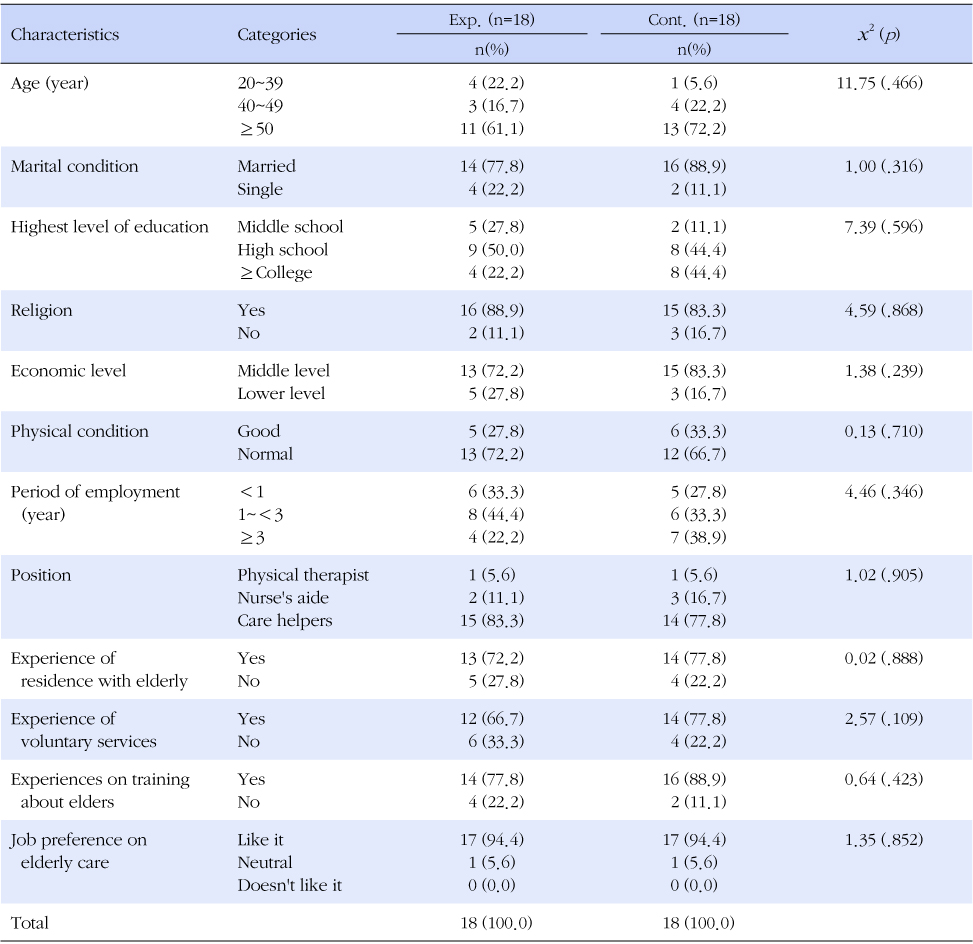Articles
- Page Path
- HOME > J Korean Acad Community Health Nurs > Volume 23(2); 2012 > Article
-
Original Article
- The Effects of Senior Simulation Programs on Elderly Care Facilities Employees' Attitudes for Elderly Care, Understanding of the Aged, Job Satisfaction, and Job Performance
- Hye-young Joung, Hye-Jin Hyun
-
Journal of Korean Academy of Community Health Nursing 2012;23(2):222-230.
DOI: https://doi.org/10.0000/jkachn.2012.23.2.222
Published online: June 30, 2012
1Director, Heewon Elderly Care Facilities, Seoul, Korea.
2Professor, Department of Nursing, Kangwon National University, Chuncheon, Korea.
• Received: December 18, 2012 • Accepted: June 28, 2012
Copyright © 2012 Korean Academy of Community Health Nursing
- 219 Views
- 0 Download
Abstract
-
Purpose
- This research is to understand the effects of senior simulation on employees of elderly care facilities and utilize it in their job training.
-
Methods
- This research is a nonequivalence control group pre-to-post quasiexperiment research. 18 employees who have experienced senior simulation are set as test group and 18 other employees who have not experienced senior simulation are set as control group.
-
Results
- The hypothesis that 'the test group which has experienced senior simulation will show a positive change in their attitude on elderly care, compared to the control group' and 'the test group which has experienced senior simulation will show a positive change in understanding of elders, compared to the control group' was supported. The hypothesis that 'the test group which has experienced senior simulation will show a positive change in job satisfaction and performance of duties, compared to the control group' was dismissed.
-
Conclusion
- The senior simulation seems to contribute to elderly care facilities employees' change in their viewpoints of elders and broaden their understanding of them. The senior simulation was meaningful to provide basic help with implementing job training programs.
- 1. Ahn ES. Construction of model in old women 1999;Seoul: Ewha Womans University; Unpublished doctoral dissertation.
- 2. Anderson-Hanley C. Experiential activities for teaching psychology of aging. Educ Gerontol 1999;25:449–456.
- 3. Ann BW. Effects of senior simulation program on attitudes and knowledges the elderly 2006;Chuncheon: Hallym University; Unpublished master's thesis.
- 4. Baik SH. Nursing student' attitudes toward the elderly and the application of senior simulation for changing to a positive attitude. J Korean Acad Soc Nurs Educ 2007;13(1):5–12.
- 5. Choi SW. Effect of simulation on geriatric unit nurses' attitude and job satisfaction toward the elderly 2007;Daegu: Keimyung University; Unpublished master's thesis.
- 6. Guak HW. The study of youth on the image of elderly 2006;Deajeon: Hannam University; Unpublished master's thesis.
- 7. Jeong HS, Kim EJ, Kim JH. Experience of aging simulation clothes among undergraduate nursing students. J Korean Gerontol Soc 2010;30(1):141–157.
- 8. Kang I. Effect of adult' senior simulation on the attitude toward aging of the elderly and senior simulator. J Welf Aged 2003;19:7–30.
- 9. Kim SG, Lim HY. The effect of senior simulation program on juveniles' knowledge and attitudes toward the elderly. Korean Soc Welf Aged 2007;37:225–248.
- 10. Kim YO. The effect of senior simulation on nurse's attitude toward the elderly & care of elderly 2009;Jinju: Gyeongsang National University; Unpublished master's thesis.
- 11. Lim KS. The recognition of aged according to the interaction experience with the grand parents 2005;Seoul: Korea National Open University; Unpublished master's thesis.
- 12. Maxwell AJ, Sullivan N. Attitudes toward the geriatric patient among family practice residents. J Am Geriatr Soc 1980;28:341–345.
- 13. Ministy of Health and Welfare. Nationwide life and welfare service needs of the elderly 2004;Seoul: Author.
- 14. Varkey P, Chutka DS, Lesnick TG. The aging game: Improving medical students' attitudes toward caring for the elderly. J Am Med Dir Assoc 2006;7(4):224–229.
- 15. Sander GF, Montgomery JE, Pittman JF, Balkwell C. Youth's attitudes toward elderly. J Appl Gerontol 1984;3(1):59–70.
- 16. Seo HK, Lee YH. Senior experience program's organization and management of the actual 2007;Seoul: Gyeongchunsa.
- 17. Shin JH. The influence of science experience studies on middle school student's attitude towards science 2009;Seoul: Sungkyunkwan University; Unpublished master's thesis.
- 18. Statistics Korea. 2008 Elderly statistics 2008;Retrieved October 1, 2008. from http://kostat.go.kr/portal/korea/kor_nw/2/1/index.board
- 19. Yoon J, Cho SM. The Gyongsan facts-aging quiz (An edumetric approach). J Korea Gerontol Soc 1982;2(1):5–11.
- 20. Yu SJ, Kim SM, Lee YJ. The effect of simulation on nurses' attitude toward the elderly. J Korean Acad Nurs 2004;34(6):974–982.
Figure & Data
References
Citations
Citations to this article as recorded by 


 KACHN
KACHN








 PubReader
PubReader Cite
Cite

